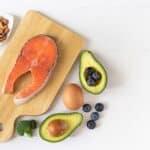Blog

3 Steps to Become a Normative Eater
Have you ever caught yourself thinking “why can Karen just eat everything she wants and still be so slim?!” If you’re like most women trapped in diet culture, the odds are the answer is yes.
BUT, have you ever taken a moment to ask yourself what Karen eats or does outside of that snapshot? Hmmm. This is when it gets interesting.
In this blog post we will explore the concept of normative eating, what it is and how you can get there.
The term ‘normative eating’ refers to the notion that eating is simply a daily activity and may look different for everyone. This is a concept closely related to intuitive eating where eating is normalised instead of glorified or seen as grounds for judgement.
A positive relationship with food may look very different for every single person, however, normative eaters share some fundamental attributes that include:
- Flexible approach to eating,
- No self-imposed limitations or restrictions
- Confidently challenge food rules
It may be very easy to fall into the stinkin’ thinkin’ trap of thinking “I have a friend who eats everything and anything and she never puts on weight, it’s just not fair!” However, we often may only see friends, colleagues or family members in snapshots, which may not reflect what or how they eat the majority of the time.
Here are THREE steps you can take to begin channelling your inner normative eater.
STEP 1. Identify a normative eater.
Consider a person in your life who may be a normative eater or intuitive eater and recall a meal you shared with them. It may be helpful to reflect on other qualities and characteristics this person has to gain insight on how he/she is able to enjoy ALL foods whilst maintain his/her wellness.
- How do you know they were a normative eater?
- What characteristics, traits, or behaviours do they have?
- How do you know they were eating flexibly?
- What habits do they have?
STEP 2. Write down your food rules.
Write down the food rules you live by and begin to assess where they came from and whether they are fact or fiction.
Are they backed by the evidence?
Are they hear-say?
Are they endorsed by non-trained professionals?
Begin to challenge these food rules as you notice they are majorly not backed by evidence for the general population.
How do the food rules you have identified compare to this person you are thinking of?
STEP 3. Move toward food neutrality.
Get out of the restriction-binge cycle and begin to move toward food neutrality. No foods are intrinsically good or bad and research shows that the mere perception that a food is ‘sinful’ may increase our desire for it. We call this the forbidden fruit syndrome.
I mean… tell me not to do something and my inner rebel immediately wants to do just that! Am I right?!
The aim is to move away from self-imposed restrictions that end up making you feel out of control and weaken your trust around food.
The outcome? The more you expose yourself to a certain food the more habituated you become, that is, it becomes less exciting.
As you begin to lose the sense of morality towards food you will better be able to attune to what our body really desires for the sake of optimal health.
See our blog post on the steps of food neutrality for more info on how to do this successfully.
–
If you want more support on becoming an intuitive eater check out our online programme dedicated to empower you to ditch dieting and make peace with food once and for all. Next programme start date is on July 9th. Spots are filling quickly so book in your FREE consultation TODAY!
EHL x













